Robert E. Howard: Peering Behind the Veil of Life
NOTE: The following article was first published on May 9, 2010. Thank you to John O’Neill for agreeing to reprint these early articles, so they are archived at Black Gate which has been my home for over 5 years and 250 articles now. Thank you to Deuce Richardson without whom I never would have found my way. Minor editorial changes have been made in some cases to the original text.
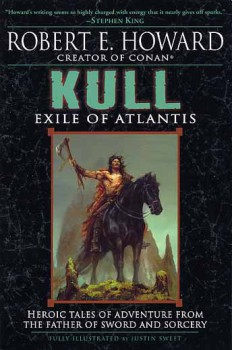
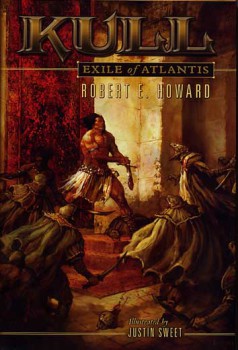 “The Mirrors of Tuzun Thune” is Robert E. Howard at his most poetic.
“The Mirrors of Tuzun Thune” is Robert E. Howard at his most poetic.
His writing had taken a quantum leap forward in quality compared with his earlier Kull stories as he transitioned from working in familiar genres to blazing a trail none had attempted before him. More than his gift for well-turned phrases and evoking imagery so powerful, it literally sears itself in the reader’s mind; Howard reaches for a depth of character and achieves a work that is both psychologically and philosophically rewarding.
Sadly, as the author would later tell his friend, Clyde Smith he was disappointed in the result and resolved to never attempt anything so deep again.
The tale starts off with Kull, plagued with ennui and yearning for something more substantive than riches, power, and transient beauty. The brooding king rejects the company of loyal Brule, the Pict who won his respect and friendship in “The Shadow Kingdom,” but foolishly takes the advice of an alluring Eastern female.
In Howard’s worldview (and in what was very much a convention of the day), the exotic female generally proves untrustworthy and the nameless beauty who appears at the beginning and the conclusion of “The Mirrors of Tuzun Thune” proves no exception.
The girl appeals to Kull’s desire for spiritual sustenance. She promises him that the wizard, Tuzun Thune possesses hidden knowledge of what was and will be and is able to converse with the dead. The allure of the occult is enough to send Kull, whose pagan faith in Valka is apparently as unfulfilling as his earthly riches, in search of the hidden knowledge promised by the Eastern wizard.
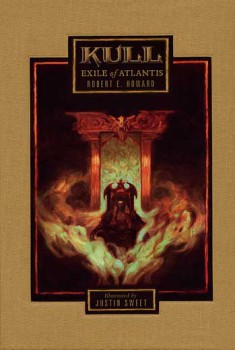
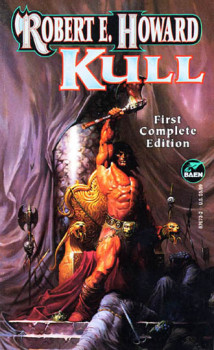 Yet when Kull visits the house of Tuzun Thune, he finds the wizard interested in little more than verbally sparring with the barbarian king. It should be noted Howard held more than a passing interest in theosophy and occultism. The promise of peering behind the veil of life was something he was certainly no stranger to contemplating.
Yet when Kull visits the house of Tuzun Thune, he finds the wizard interested in little more than verbally sparring with the barbarian king. It should be noted Howard held more than a passing interest in theosophy and occultism. The promise of peering behind the veil of life was something he was certainly no stranger to contemplating.
Just as Kull appears to tire of the wizard’s bantering, Tuzun Thune tempts him into gazing into his mirrors with the promise of wisdom for “mirrors are the world.” Kull gazes and is bewitched by his own reflection and is immediately confronted by the thought that his reflection might in fact be the real him and that he is only the reflection. This is more than just a passing primeval fear, but the recurring thought that keeps Kull mesmerized day after day even at the exclusion of viewing the distant prehistoric past or the far-flung future.
Kull is momentarily distracted to see the world map of his era radically altered to reflect the passage of centuries. The wizard responds with what might be the author’s own code of existence,
“Time strides onward, we live today, what care we for tomorrow or yesterday? The Wheel turns and nations rise and fall; the world changes, and times return to savagery to rise again through the long ages….The nations pass and are forgotten, for that is the destiny of man….I brood not over the lost glories of my race, nor do I labor for races to come. Live now….The dead are dead, the unborn are not. What matters men’s forgetfulness of you when you have forgotten yourself in the silent worlds of death?”
Recognizing the barbarian’s fears, Tuzun Thune asks him the very thought Kull fears to voice, “…is it in truth you?” Kull expresses his deepest fear when he replies, “Which of us is the ghost of the other? Mayhap these mirrors are but windows through which we look into another world.”
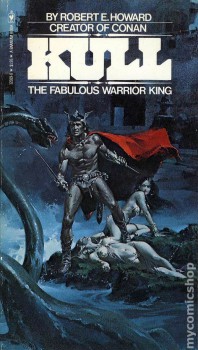
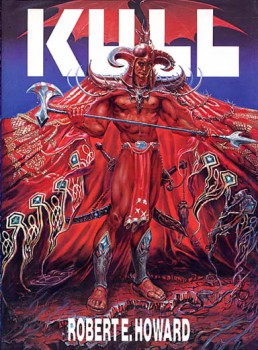 This is indeed the truth of fiction rendered in terms of pure poetry. As much as Kull may be Howard’s alter ego, so too is Tuzun Thune for it is the wizard who, like the author, draws his reader into other worlds of both dream and nightmare and dares to make him question the very nature of identity and reality.
This is indeed the truth of fiction rendered in terms of pure poetry. As much as Kull may be Howard’s alter ego, so too is Tuzun Thune for it is the wizard who, like the author, draws his reader into other worlds of both dream and nightmare and dares to make him question the very nature of identity and reality.
Kull asks the question that man asks today as he did in centuries past, “Tell me, wizard who are wiser than most men, tell me, are there worlds beyond our worlds?” The wizard’s enigmatic reply links us back to the spiritual yearning that gripped Kull’s consciousness at the story’s outset, “A man has eyes, let him see, who would see must first believe.”
Howard’s father was intrigued by the writings of Madame Blavatsky and the author shared his father’s interest in Theosophy. Howard expresses this here by having Kull on the verge of astral travel when Tuzun Thune tells him (sounding exactly like a student of Theosophy, himself):
“See and believe, man must believe to accomplish. Form is shadow, substance is illusion, materiality is dream; man is because he believes he is; what is man but a dream of the gods? Yet man can be that he wishes to be; form and substance, they are but shadows. The mind, the ego, the essence of the god-dream – that is real, that is immortal. See and believe, if you would accomplish, Kull.”
It is fitting that it is the noble Pict, Brule who rescues Kull from dissipating into astral nothingness and passing forever into the world hidden behind the mirrors. Brule rejects belief in the occult and shuns any sign of its reality.
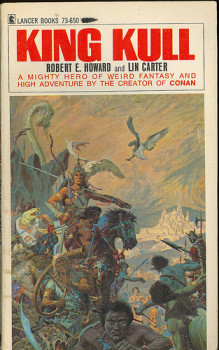 Kull recognizes the wisdom of this, but is haunted by having come so close to answering one of man’s eternal questions. There remains a lingering regret that he failed to complete the experiment.
Kull recognizes the wisdom of this, but is haunted by having come so close to answering one of man’s eternal questions. There remains a lingering regret that he failed to complete the experiment.
It is a gnawing regret common to alchemists of old and modern occultists alike.
It is also fitting that Howard, who would explore similar territory in “The Tower of the Elephant,” initially determined to avoid returning to theosophical stories in the future and yet as the later Conan adventure demonstrates, like Kull, Howard longed to peer behind the veil of this life and see with clarity into the world beyond our own.
William Patrick Maynard was licensed by the Sax Rohmer Literary Estate to continue the Fu Manchu thrillers beginning with The Terror of Fu Manchu (2009; Black Coat Press) and The Destiny of Fu Manchu (2012; Black Coat Press). The Triumph of Fu Manchu is coming soon from Black Coat Press.
I’ve read Kings of the Night two days ago, and in it Howard also explores interesting concepts of time. Which had been discussed for a while but also had entered mainstream physics during his childhood.
I had no idea REH was influenced by Blavatsky. Now what I really want is a glimpse into an alternate universe in which he got together with Yeats to talk Theosophy. That would have been something to see.